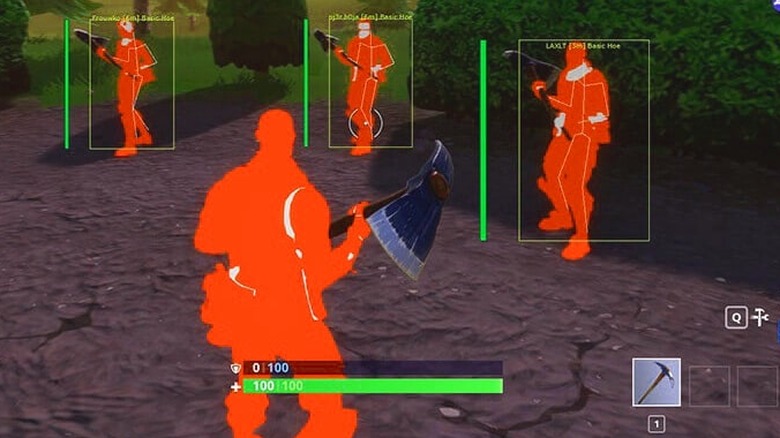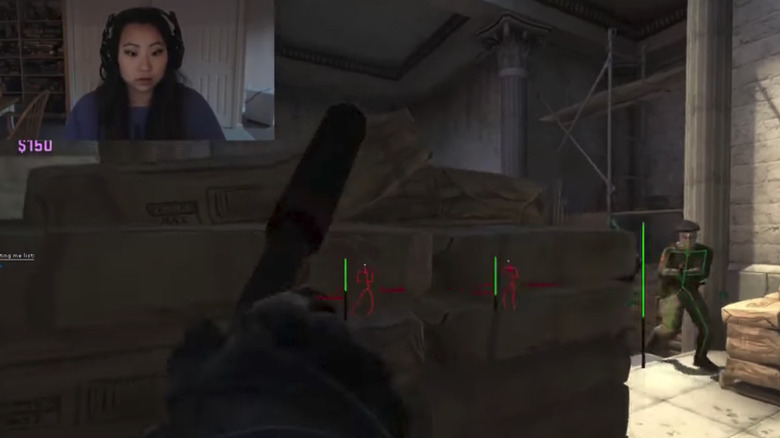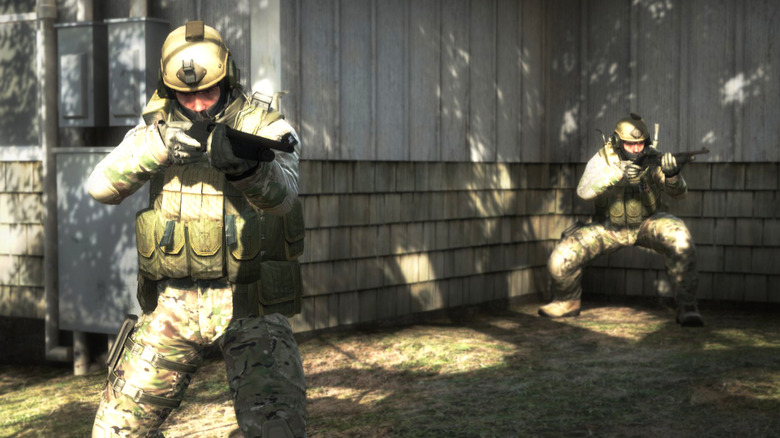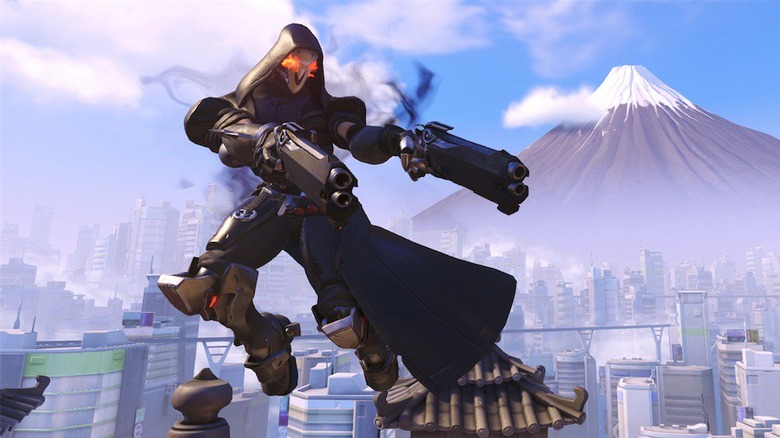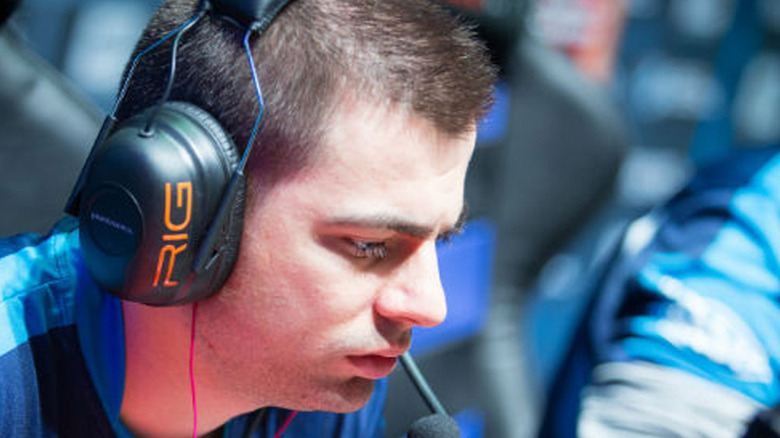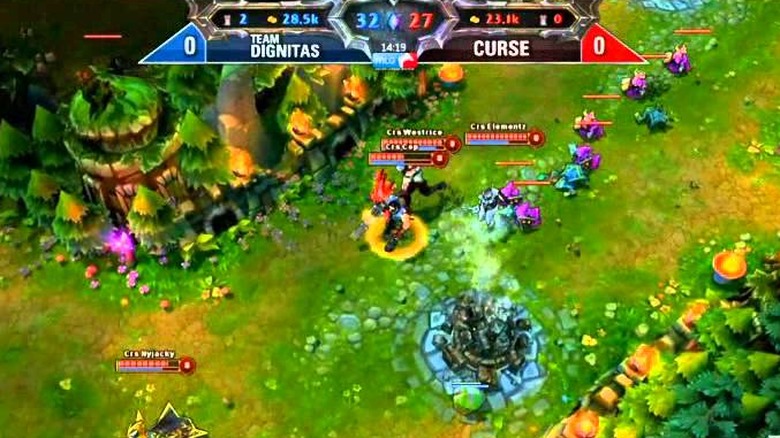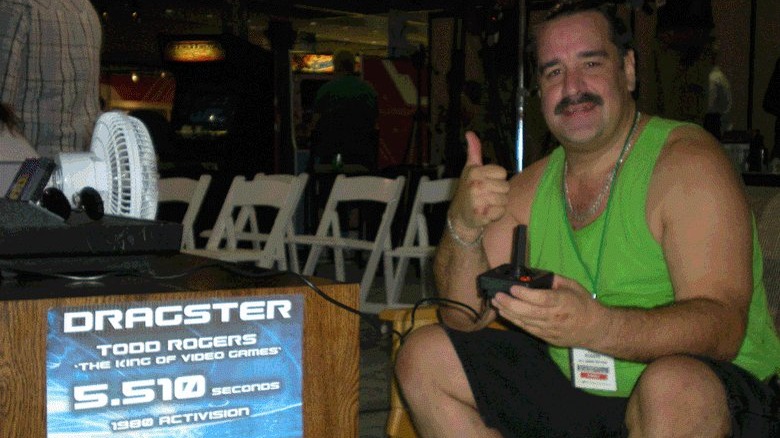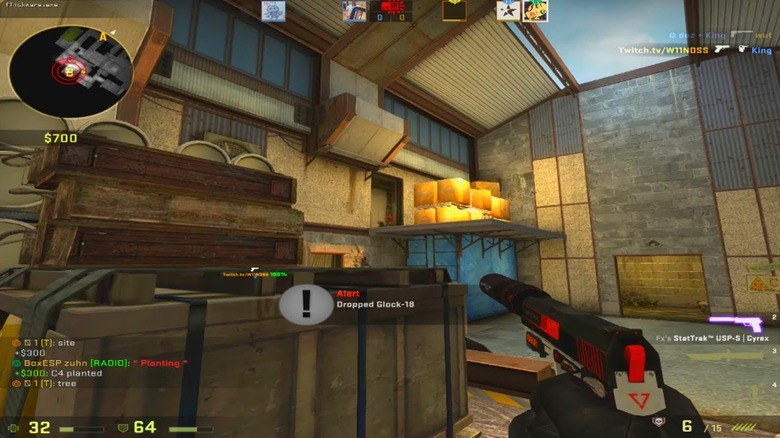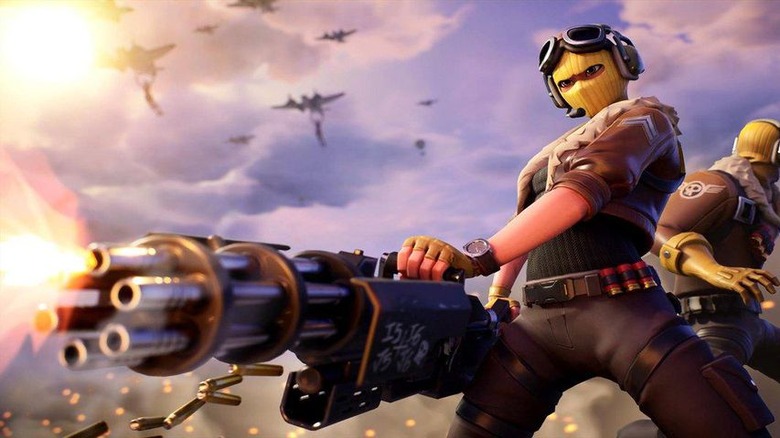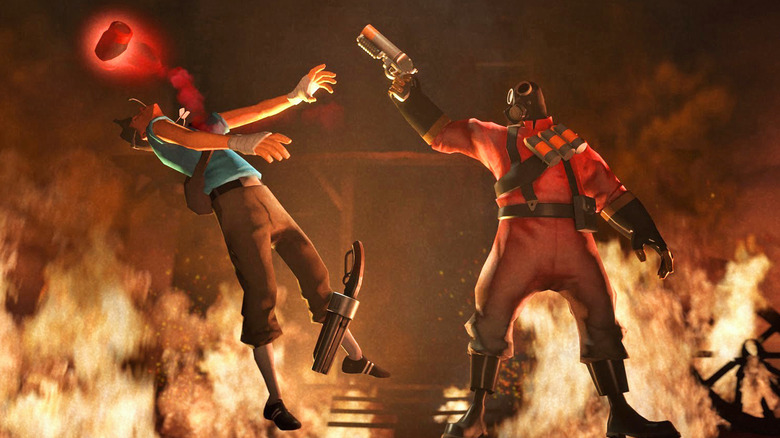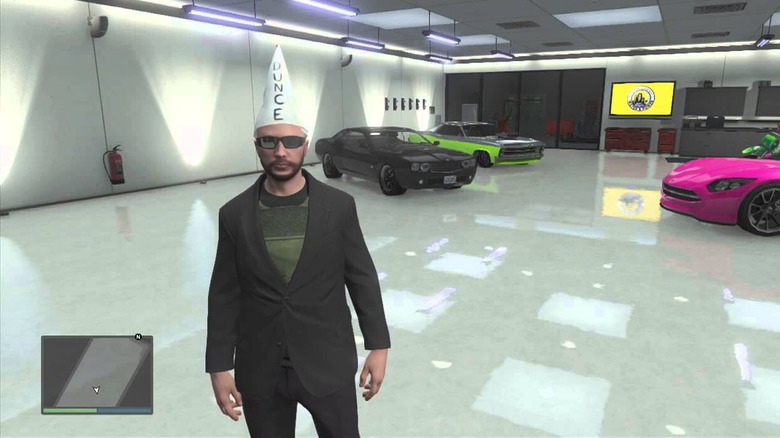Senseless Cheaters Who Were Rightfully Banned
There's an old saying that goes, "Cheaters never prosper." However, cheaters also tend to try to weasel their way out of trouble when they're caught cheating. We're not talking about Game Genie cheat codes or turning on infinite ammo in your single-player Grand Theft Auto campaign. No, the real issue arises when people are underhanded during Twitch streams or tournaments but then try to play it off like everyone didn't just see what they were doing.
While it's usually frustrating to see someone breaking the rules to get ahead in a competitive setting, it can also occasionally result in some hilarious moments. Some of the following gamers ended up being a little too slick for their own good, while a few of them were hopelessly clumsy in their attempts at gaming the system. Maybe cheaters never prosper, but the important thing is that they are usually good for a laugh.
That's just classic Clara
A Twitch streamer with the handle MissQGemini unknowingly launched a new meme at the same time she launched her cheating software. For some reason, she elected to load up multiple cheat programs live on camera. Her match in Counter-Strike: Global Offensive started up with visible markers of where other players were on the map. She also had an aimbot installed. Again, however, not a shred of this was hidden from the viewers.
When she realized that several viewers had noticed her cheating, she tried to play it off in the most unintentionally hilarious way possible: by blaming someone who wasn't there. She began asking if any of her viewers or teammates had ever gotten "that weird glitch" before, assuring folks that she wasn't meaning to be an absurdly powerful killing machine. Then she started calling out for her friend "Clara," asking if she put something on her computer.
She then said she was going to uninstall CS:GO and logged off. Her Twitch channel was later banned, but not before blaming "CLARA" became a meme in itself.
A team forsaken
In 2018, a professional Counter-Strike: Global Offensive player by the name of Nikhil "forsaken" Kumawat was participating in a major CS:GO tournament when things got awkward. Kumawat was caught using an auto-aim cheat, after which one of the tournament administrators paused the game and came over to investigate. In footage of the incident, Kumawat is seen trying to swat the administrator's hand away from the mouse as he apparently tried to delete the offending software. Kumawat's team was disqualified and actually disbanded following the embarrassing incident.
Later evidence revealed previous cheating on Kumawat's part, leading to him being issued a five-year ban from tournament play. Kumawat later claimed that he didn't delete the cheating program, but that his anti-virus software did it for him. So yes, he did eventually own up to the cheating.
However, he also followed this confession up by saying he wishes he'd never touched CS:GO in the first place, saying, "Nothing good has happened to me since the day I started playing the game." He also maintained that the cheating program gave him "a slight aim advantage," but it shouldn't have been obvious. Yeah right.
Cheating like a Boss(land)
Bossland was a German company that made cheats and exploits for popular games, but the cheats that got them in real trouble were the bots they made for Overwatch. Blizzard sued Bossland for copyright infringement, claiming the bot-makers "had bypassed Blizzard anti-cheat protection, altered its games without permission, and effectively resold its code." Bossland chose not to contest the $8 million lawsuit, claiming that Blizzard had no jurisdiction in Germany. Furthermore, they maintained a website for quite some time that boldly proclaimed, "Botting is not against any law."
That site is now defunct, however, due to what eventually became of Bossland. Though Blizzard won the lawsuit in California, German courts ruled that Bossland did not have to pay the $8 million. However, the damage had been done. Bossland took down the hacks that made them famous, losing most of their traffic in the process. Not only that, but their attempt at a legitimate game of their own, Epic Car Factory, was met with negative reviews. We'd say Bossland should have stuck with what they knew best, but what they knew best was illegal.
Overwatch cheaters get banned, then get angry
Blizzard has no problem with cracking down on cheaters in decisive ways. Though there are plenty of cheat programs and bots, they are eventually detected and dealt with. Many Overwatch players found this out the hard way back in 2016 when the banhammer was dropped on them right after the game received an update. Though they were using programs that were supposedly undetectable by Blizzard, the update rooted them out and their accounts were quickly dismissed.
This resulted in quite a bit of backlash from cheaters who thought Blizzard was overreacting. Some claimed that they shouldn't have been banned because they only used the cheat in question once or twice, while at least one gamer was angry enough to threaten to sue Blizzard (what their case could have possibly been remains unclear).
In response to the uproar, Blizzard released a statement that clarified the wide swathe of bans were all part of an "ongoing process" to ensure their measures against hacking were up to date. Blizzard further explained, "'Play nice; play fair' is one of our core values."
But everyone else is doing it
A notable Counter-Strike: Global Offensive competitive player by the name of Hovik "KQLY" Tovmassian was banned from the game when he was caught using a cheating program during a match. While the cheating script in question is much harder to detect than others, the installation was detected by Valve Anti-Cheat and the banhammer fell swiftly. This ended KQLY's 12-year stint playing CS:GO competitively and disqualified his teammates from the then-upcoming tournament at Sweden's DreamHack Winter 2014.
KQLY explained that he began using the software after its developer contacted him and told him that many other people in the competitive gaming scene were using the same cheats ... which isn't exactly the best reason to do something illegal. It's the gaming equivalent of jumping off a bridge because all of the other kids are doing it. To KQLY's credit, though, he recognized that he'd made a mistake, telling his fans, "I was banned by VAC and unfortunately it was justified," while acknowledging that he felt "like an idiot" for using the cheating software in public matchmaking.
A cursed agreement
There was quite an upset at North Carolina's 2012 Major League Gaming summer championship when both the first and second place winners of the League of Legends tournament found themselves disqualified. Prior to their final match, teams Curse and Team Dignitas agreed to split the prize money, then proceeded to play a very low-stakes match with random characters, rather than the well-oiled matches people expect from a championship game. There's some debate over whether or not Dignitas also threw the match, but their mutual decision to split the earnings is irrefutable, having occurred "in a public, crowded setting," according to MLG's Adam Apicella.
Following the tournament, Curse posted a video explaining that the random nature of the match was meant to "be kind of fun" for their fans, while also denying the accusations of fixing the match. However, a statement regarding the incident on MLG's website (as reported by The Mary Sue) read, "Both teams, as well as MLG and Riot, agree that any collusion, or anything involving not playing a tournament match to win, warrants disqualification." At least in this instance, the parties involved admitted to wrongdoing, even if they initially thought they had a good reason for it.
Breaking (and losing) records
This one gets a little messy, because it involves a gaming world record that was held up for decades. In 1982, a man by the name of Todd Rogers completed the Atari 2600 game Dragster in an astonishing 5.51 seconds. This time was verified by Activision, Dragster's publisher, and in 2001, Rogers was recognized by Guinness World Records for having the longest-standing video game record.
Trouble for Rogers seemingly began when a speedrunner named Eric Koziel couldn't beat Rogers' score even in a tool-assisted run. Rogers maintained that Koziel was simply playing the game incorrectly, otherwise he could have matched Rogers' score. Then, Twin Galaxies, a group that maintains a database of the world's video game records, disputed the record. Between Koziel's videos and their own research, Twin Galaxies concluded that Rogers' time was "not possible under standard and normal play conditions." With this new evidence, they removed Rogers' scores from their database, banning him from their scoreboards, then contacted Guinness about their findings.
Though Dragster designer David Crane believed Rogers' records to be legit, Guinness officially removed Rogers' records as well. Guinness also vowed "to partner with Twin Galaxies for further video game record verification."
When your fans know you're a cheater
As noted by Dexerto, Zuhn is a YouTuber who has faced accusations of cheating for years. In particular, he's been known to upload videos that allegedly show cheating software in action. In May 2019, two of his Steam accounts were banned, though Zuhn seemed to be completely in the dark regarding the reasoning.
The difference between Zuhn's reaction to the ban and his fans' was actually pretty hilarious. For his own part, Zuhn claimed that the ban was a way of trolling him: "its obvious I don't cheat. But we'll see what happens. idk whats going on." On the other hand, when Zuhn posted a poll on Twitter asking his followers if they thought he'd really cheated, the response was overwhelming: 79% of the votes were "Yes." Yikes.
Zuhn remained hopeful that the bans could eventually be appealed and overturned, but it's not a great sign when your own fans don't think you're playing on the up and up.
When cheaters strike back
Though Epic Games has filed lawsuits against hackers in the past, this particular case from 2018 was little different. The cheater in question, referred to as C.R. rather than his full name (due to his status as a minor), was accused of using a cheat program in Fortnite Battle Royale and then posting videos of his exploits with links to where viewers could download the software for themselves.
When this video was taken down, C.R. proceeded to post a second YouTube video wherein he admitted to cheating and falsely claimed that his videos were protected under fair use laws. He furthermore gave his viewers the email of one of Epic's lawyers that had taken his video down (a huge no-no) and created another account from which he streamed himself using the same cheats, almost daring someone to call him on it.
Well, Epic definitely called him on it. The cheats infringe on Epic's property, so by posting them for his 8,000 followers, C.R. violated both YouTube's policies and Epic's, resulting in Epic filing a lawsuit. As The Verge puts it, "Being a minor can't stop you from getting sued for copyright infringement."
Cheaters try to start a riot
Again, cheaters never prosper. However, sometimes they try to make it so that no one else prospers, even after they're long gone. That was the case with a number of players banned from Team Fortress 2 for using a cheating script called "catbot," one of a few different scripts which Polygon notes "enable players to spam and use a variety of auto-aim tactics."
Unfortunately, as Polygon went on to report, these bans unfairly blew up in Valve's face as the cheaters began to spread lies among Team Fortress 2 players. They spread rumors that Valve Anti-Cheat was simply dropping the banhammer on anyone that had the word "catbot" or some derivative in their username, even if they weren't actually using the cheats in question. Believing that innocent players were being targeted by VAC, Team Fortress 2 forums were flooded with complaints regarding the alleged unfair bans.
In response, Valve engineer John McDonald explained that the accusations "are a tactic employed by cheaters to try and sow discord and distrust among anticheat systems." Getting caught cheating and then trying to ruin the game for everyone else? Now that's not fair.
Bad Sports stick together
In a bizarre case, one GTA Online player claims he resorted to cheats to recover from what he says was an unfair punishment from Rockstar Games.
GTA Online has a safeguard wherein players who engage in bad behavior or cheating can find themselves labeled a "Bad Sport" and are then sort of sequestered away where they can only play with other Bad Sports. A player called Rev Drucifer found himself on a mission with someone running all kinds of wacky mods, though Drucifer claims he didn't realize it at first. Parts of the story don't quite add up, such as when he claims money was literally shooting out of his character's rear end, but the end result was Drucifer finding himself labeled a Bad Sport by association.
While Bad Sports are usually only on a temporary "time out," Drucifer's character seemed stuck, with Rockstar unable to fix it for him. It apparently took Drucifer hiring someone to hack GTA to get him back into regular play. While it seems like things worked out for Drucifer, the unlikely scenario of "accidentally" cheating and then making a comeback by cheating makes this a fishy story all around.
Kid x gonna give it to ya
Kid x was mid-match in Overwatch when his winning streak ended abruptly. Unfortunately for this Korean gamer, he was openly using an aimbot to aid his targeting and increase his accuracy.
Blizzard has some famously intense anti-cheating policies, so it's pretty wild that it took Kid x that long to get caught. After all, he was a highly ranked player and, as pointed out by Kotaku, even with the aimbot he's using, Kid x is ... not great playing as Widowmaker, to put it lightly. It raises the question of how long he'd been using aimbots in matches to boost his ranking.
The final twist can be found in a video of the incident posted by Kid x, in which he claims he wasn't cheating at all. According to Kid x's video description, he "recorded someone is cheating on a broadcast that is all." If that were the case, then the other person's account would have been targeted by Blizzard, right? It's a bizarre post-script to what seems to be a pretty cut and dry case of cheating.

